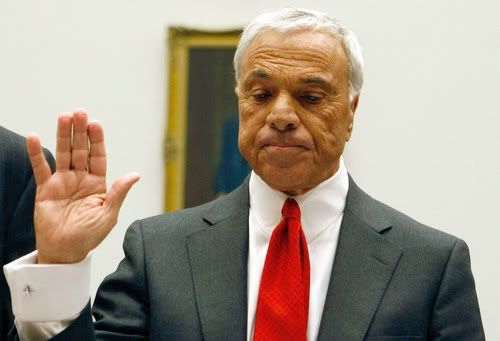In the light of the U.S.’s worst housing debacle in the last half-century, and no real end in sight, the perpetually tanned founder of Countrywide Financial Corp., Angelo Mozilo, was hammered by a congressional committee for unloading $141 million in stock options. Mozilo claims that that his gain was fortuitous and not timed or manipulated before the company collapsed. Rep. Henry A. Waxman, chairman of the House Committee on Oversight and Government Reform, does not see it that way.
The company lost $1.7 billion during the last two quarters of 2007, and its stock plunged 80% between February 2007 and the end of the year. Over $20 billion stock value was wiped out literally overnight. Nevertheless, during that same period Mozilo was compensated with $1.9 million salary and $20 million in stock bonuses contingent upon company performance. Not a bad year for the 69 year-old executive who was also planning his retirement for 2008. The company and stockholders lose and he wins. Millions of homeowners lose their equity, default on their loans and are cast out of their homes, and Mozilo makes out like a bandit.
And now, it has been revealed that the FBI is investigating Countrywide and its executives, say Mozilo, for alleged securities fraud. Throw in the Justice Department investigation, according to the New York Times, on top of the FBI for not being completely honest with the public about the depth of possible defaults unraveling across the country.
And unraveling they are. The Los Angeles Times recently reported that according to a report by Moody’s Economy.com nearly 9 million homeowners, close to one-tenth of all mortgage loans nationally, will have seen their equity evaporate by the end of this month or will have mortgage balances that exceed what their homes are worth. It would be outrageous that borrowers would just walk away from these mortgages, their obligations. At least this is the attitude of Treasury Secretary Henry M. Paulson, Jr. who “contends that homeowners are obligated to keep paying on their home loans.” “Any homeowner who can afford his mortgage payments, but chooses to walk away from an underwater property is simply a speculator – and one who is not honoring his obligations.”
Now, that seems very morally trite considering the unwillingness of the Bush administration, and congress for that matter, to intervene on the side of the lowly homeowner occupant (not speculator) in the worst housing downturn perhaps since the Great Depression of the 1930s. In fact, they wouldn’t be doing anything worst than their lender – such as in the case of Countrywide, but many other financial institutions who also gamed the system, preyed on anxious consumers, steered clients to exotic loan products, and refined the practices of predatory lending. And, they made billions of dollars. When we factor in how these loans were sold on the secondary market to investors as securities, perhaps trillions of dollars were pocketed.
Federal Reserve Chairman, Ben S. Bernanke last week pointed out the obvious. Millions of homeowners will walk away from their mortgage debt unless banks act quickly by cutting the size of the loans, and not just trim interest rates. I applaud Bernanke for agreeing with me. This is exactly what I recommended to the California Senate Budget Committee in a hearing conducted in Sacramento during February 2007, along with the Greenlining Institute. Some sincere California legislators continue to probe possible remedies to the current crisis, although their hands are pretty much tied. They do not control the financial mechanisms to regulate the banking industry or tinker with interest rates and credit. They do have the authority, however, to rein in and punish unregulated mortgage companies and brokers who continue to prey on the unsuspecting and uneducated borrower. I’m still waiting for that legislation. We endured 2007 and nothing from the California legislature, and only platitudes and empty promises from the Governator.
Bernanke knows of what he speaks. “Housing prices are falling in many parts of the country… the resulting decline in equity reduces both the ability and the financial incentive of stressed borrowers to remain in their homes.” His matter-of-fact advise to the banking industry considering the alternative was to take their knocks and acknowledge that “principal reductions that restore some equity for the homeowner may be a relatively more effective means of avoiding delinquency and foreclosure.” In other words, do what they normally do when businesses default on their loans – take the loss and rewrite the loans realistically.
Could this crisis have been avoided? Probably not. I vividly recall visiting the splendorous Calabasas headquarters of Countrywide Financial Corp. in 2006 to meet with CEO Angelo Mozilo, part of a Greenlining Institute delegation, to advocate against predatory lending practices and call upon the top mortgage lender nationally to create an industry model for good lending practices. How naïve of us! Little did we know that Mozilo had already increased his payroll by 12,000 new hires to aggressively market newfangled loan products to induce an unsophisticated public to buy into what has become an unmitigated American nightmare. Tanned, cocky, undersized stature, with a toothy smile, Mozilo extolled his rags to riches story, the son of poor Italian immigrants who never owned their own home, and guaranteed us of his virtuous motives that every American should be a homeowner. This was his mission, he claimed. Today, two-thirds of the sub-prime loans issued by his company are in default – teetering on foreclosure.
Bank of America has agreed to pull Countrywide’s chestnuts out of the fire for $4 billion. Will it do the same for the hoodwinked borrowers? That remains to be seen.


No comments:
Post a Comment